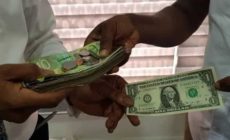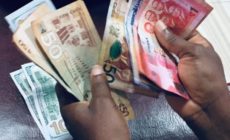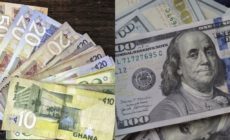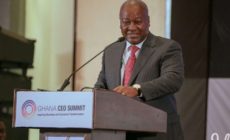Cedi loses 7 pesewas in Q1- But worse than naira, Kenyan shilling
- Posted on
- Comment
 THE Ghana cedi which in recent years has witnessed sharp depreciation against the US dollar during the beginning of every year recorded a marginal 7 pesewa
THE Ghana cedi which in recent years has witnessed sharp depreciation against the US dollar during the beginning of every year recorded a marginal 7 pesewa
loss in value against the American currency, about 0.48 percent depreciation for the first quarter of 2016.
Though it crossed the GH¢4 mark on Monday January 18, 2016 against the greenback, it has been able to turn around the scale to close the first quarter of 2016 on a favourable note at about GH¢3.87 against the dollar.
However, neighbouring Nigeria’s naira and Kenyan shilling beat the cedi in terms of performance against the US dollar with 0.52 and 0.95 percent appreciation against the American currency.
The Ghana cedi lost about 60 pesewas in value to the US dollar in 2015, making it one of the worst performing currencies in Africa.
Though it started the year at GH¢3.80 against the US dollar, it hovered around GH¢3.88 against the green note on March 31, 2016.
The Bank of Ghana (BoG) website however quoted the local currency at GH¢3.83 to one American dollar.
According to investment firm, Frontline Capital Advisors, Morocco’s dirham was the best performing currency among six currencies captured on the African continent. It appreciated by 2.27 percent against the US dollar.
It was followed by the Mauritius rupee which also appreciated by 1.91 percent against the dollar.
While Egypt’s pound was among the worst performing currency on the African continent, depreciating by about 11.87 percent against the dollar, the CFA franc which is the currency used in 14 African countries has depreciated by about 2 percent.
The South African rand and the Liberian dollar also depreciated marginally against the US dollar in the first quarter of 2016, less than 3.0 percent.
Going forward, most analysts and economists are uncertain whether the cedi will be able to withstand its relatively fine performance against the US dollar.But they have commended the International Monetary Fund stabilisation programme which, they believe, has largely contributed to the relative stability of the cedi against the dollar.
Senior economist at the Institute of Statistical, Social and Economic Research, Professor Peter Quartey believes the IMF’s presence has restored fiscal discipline in the economy and brought hope to the country’s economic outlook.
The Bretton Wood institution has injected more than half of the US$914 million support into the Ghanaian economy to improve the balance of payment and current account situation.
By Augustine Amoah










 (Selorm) |
(Selorm) |  (Nana Kwesi)
(Nana Kwesi)